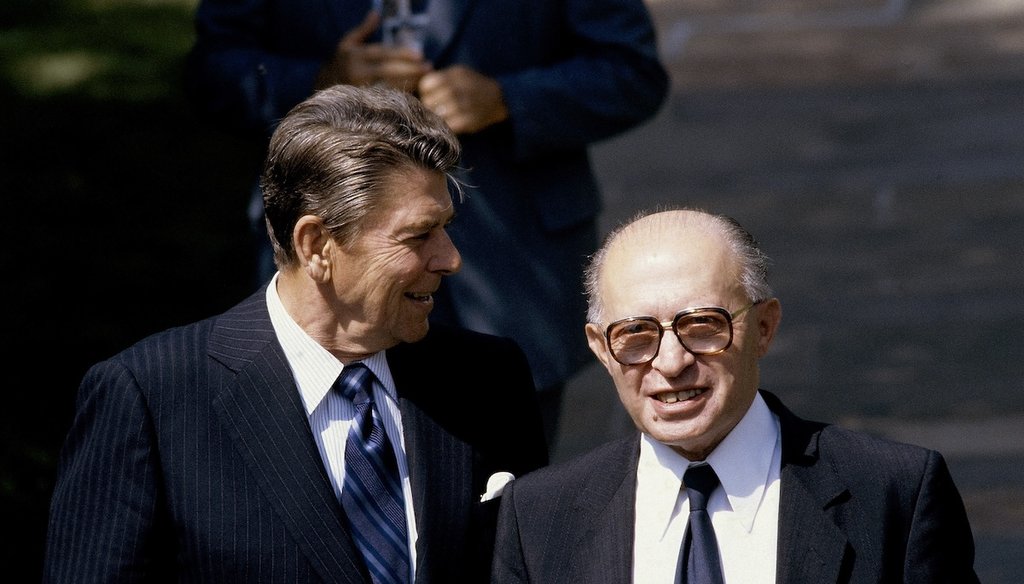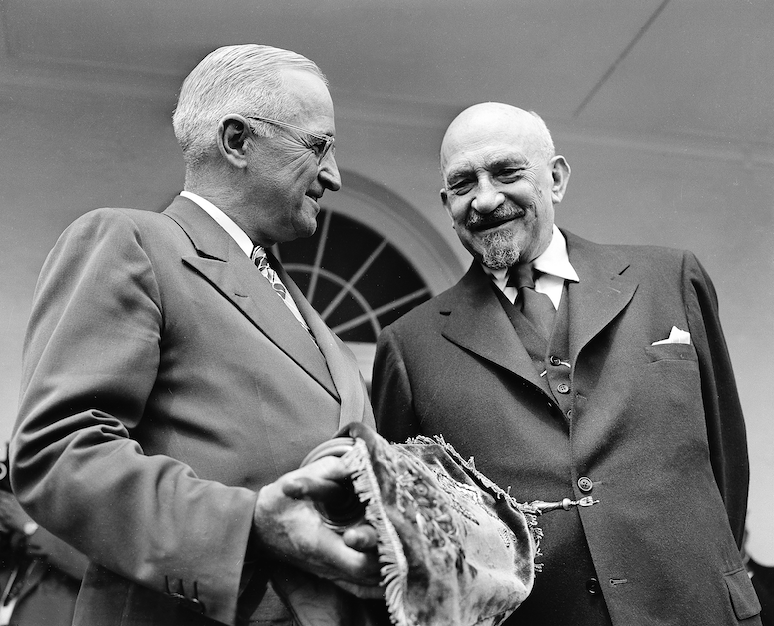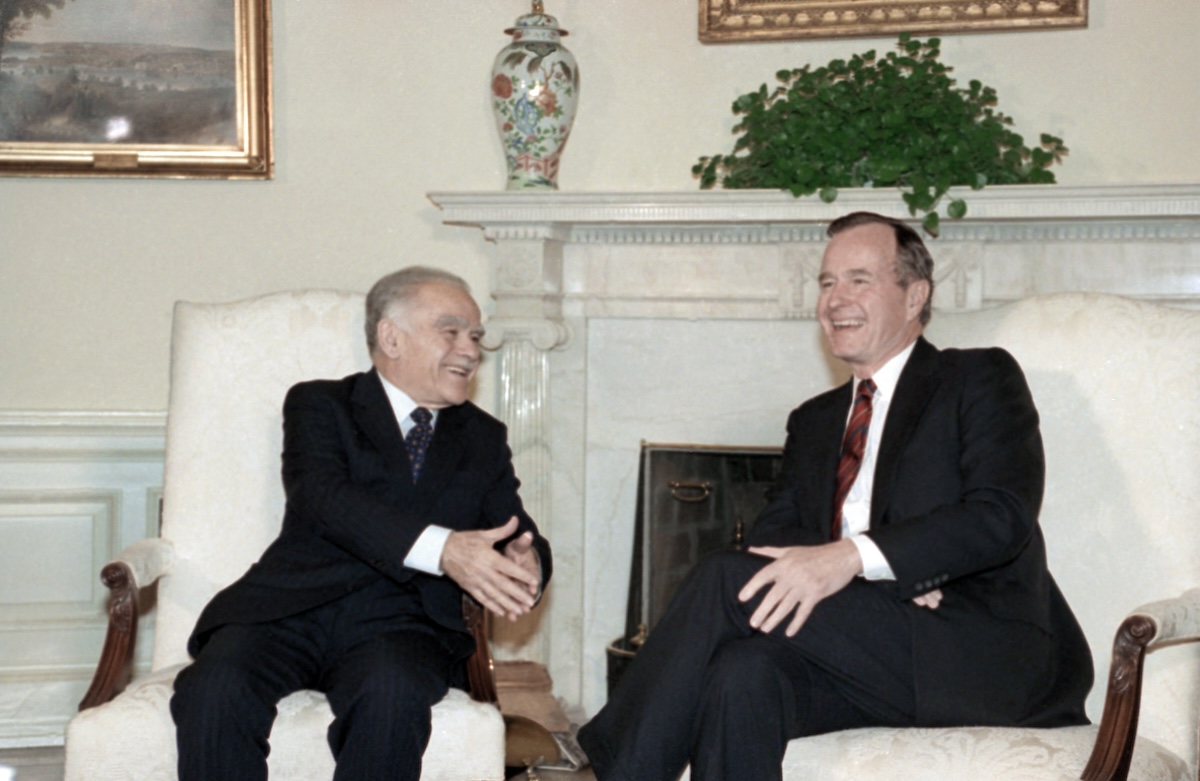Stand up for the facts!
Our only agenda is to publish the truth so you can be an informed participant in democracy.
We need your help.
I would like to contribute

President Ronald Reagan, left, and Israeli Prime Minister Menachem Begin in 1981. (AP)
President Joe Biden’s decision this month to pause a shipment of heavy weaponry to Israel amid that country’s war against Hamas in Gaza was widely seen as an effort to discourage a full-scale attack on Rafah that could kill large numbers of civilians.
Critics, however, characterized the pause as an unprecedented departure from the United States’ long-standing commitment to Israel during a war in which that nation’s security is at stake.
On May 12 on CBS’ "Face the Nation," for instance, Sen. Tom Cotton, R-Ark., accused Biden of having "imposed a de facto arms embargo on Israel."
Host Margaret Brennan pressed Cotton on whether Biden’s actions were much different than what previous presidents had done when they believed that Israel was pursuing an unwise course. She cited actions by Presidents Ronald Reagan and George H.W. Bush.
Cotton rejected the comparison.
"Ronald Reagan's decision to pause the delivery of fighter jets in the 1980s was totally different from what has happened here," he said.
Reagan, Cotton said, "knew that the pause of fighter jets would not interfere with Israel's fighting because they had plenty of fighters. He did not pause munitions. Joe Biden is not sending munitions in the middle of a shooting war that's a war of survival."
Other Republicans have made similar points, including Sen. Lindsey Graham, R-S.C., on May 12 on NBC’s "Meet the Press."
Are Biden’s actions unprecedented? Not really, experts told PolitiFact.
Multiple presidents have sought to influence Israel’s actions with policies that created distance between the U.S. and Israel, although there’s less agreement on whether Biden’s move is greater in severity or comes at a more delicate time for Israel.
"Biden is doing what every president has done since 1948: He's trying to support Israel without alienating the entire Arab world," said Lance Janda, a military historian at Cameron University. "His job is harder because the current conflict has lasted so long and produced so many civilian casualties in Gaza. Israel is almost completely isolated in the international community, which is bad for them and for (the United States) at the same time."
Perhaps sensitive to the criticism, unnamed Biden administration officials told news outlets May 14 that the White House was proposing more than $1 billion in weapons agreements for Israel, including tank ammunition, tactical vehicles and mortar rounds. It is not PolitiFact’s policy to rely on anonymous sources; when we asked the White House for confirmation, we received no response.
At the White House, President Harry Truman holds a copy of the Torah presented to him by Chaim Weizmann, then the chairman of Israel’s Provisional State Council, on May 25, 1948. (AP)
There are multiple examples of presidents pursuing moves that created friction between the U.S. and Israel.
In 1948, President Harry Truman pursued an overall policy of supporting Israel following its establishment. Despite this, his administration, pushed by State Department officials, maintained an arms embargo on Israel and surrounding Arab countries throughout that pivotal year. The embargo had begun as a way of limiting violence in the lead-up to independence.
In 1957, President Dwight D. Eisenhower threatened sanctions against Israel if it didn’t withdraw from the Egyptian Sinai peninsula after invading it following Egypt’s nationalization of the Suez canal, a key Middle East waterway.
Eisenhower later wrote that to pressure Israel into withdrawal from Sinai, he preferred "a resolution which would call on all United Nations members to suspend not just governmental but private assistance to Israel."
A decade later, in the lead-up to the Six-Day War in 1967, the U.S. imposed an arms embargo on all participants, including Israel. "It was largely symbolic, since the Israelis won the war, but we did do it," Janda said.
The president at the time, Lyndon B. Johnson, "was slow to come to Israel's defense," according to Dennis Ross, a veteran Middle East diplomat and author of "Doomed to Succeed: The U.S.-Israel Relationship from Truman to Obama." Johnson "seemed interested in helping Israel … but he felt constrained by limited resources and procedural hurdles."
In 1981, Reagan paused shipments of F-16 fighter jets to Israel in response to what Secretary of State Alexander Haig called "the escalating cycle of violence in the Middle East." The pause came after Israel destroyed an Iraqi nuclear reactor that was under construction and after it bombed Beirut, the Lebanese capital.
Reagan lifted the suspension of military aircraft for Israel later that year, but the U.S. and Israel were at odds again by April 1983, when Reagan said that until Israel withdrew its forces from Lebanon, he would not permit the transfer of some 75 F-16 fighter jets.
Lawrence Korb, who served as assistant defense secretary from 1981 through 1985, wrote in 2021 that Reagan "allowed 21 U.N. resolutions that directly or indirectly condemned Israeli behavior and actions to pass. These included condemning Israel for the bombing of Lebanon, Iraq, and Tunisia."
President George H.W. Bush meets with Prime Minister Yitzhak Shamir of Israel on April 6, 1989, in the White House. (AP)
In September 1991, Reagan’s successor, George H.W. Bush, told reporters he’d asked Congress to defer considering Israel’s request for $10 billion in loan guarantees. News reports then said Bush’s delay request was intended to stop Israel from building settlements in occupied Palestinian territories.
"Both Reagan and George H.W. Bush played hardball, or harder ball, with Israel than Biden," said Stephen Knott, a presidential and foreign policy historian who retired in 2022 from teaching at the U.S. Naval War College.
However, it’s been decades since the last similar break with Israel; remembering that far back requires historical knowledge.
Biden’s actions "would be the strongest show of resistance against any Israeli policy I can think of since" Bush’s withholding of loan guarantees 33 years ago, said Michael O’Hanlon, senior fellow and director of research in foreign policy at the Brookings Institution, a Washington, D.C., think tank.
Historians told PolitiFact agreed that the U.S. weapons pause comes at an inopportune time for Israel.
After Hamas’ Oct. 7 cross-border terrorist attacks, "Israel was revealed as vulnerable in a way it had not been since 1973," said David Greenberg, a presidential historian at Rutgers University. "If this war were like the previous Gaza incursions, there would be far less urgency. But if the Israeli goal is to wipe out Hamas as a fighting force, a goal the U.S. has endorsed, then depriving it of munitions in the middle of the war is a lot more controversial than the fighter jets controversy under Reagan."
In a Wall Street Journal op-ed, Michael Singh, managing director of the Washington Institute for Near East Policy, acknowledged historical parallels between Reagan’s conundrum and Biden’s that may "appear compelling." However, he wrote, the current conflict "was triggered by the worst terrorist attack on Israel in its history — one that was unprovoked and utterly depraved, and that followed a period of U.S.-Israeli-Arab coordination on Gaza."
Nevertheless, historians expressed skepticism to PolitiFact that today’s situation poses a uniquely existential threat to Israel. Many of the previous U.S.-Israel rifts have come amid wars that involved Israel.
For instance, the 1948 war that enabled Israel’s independence "was much more ‘existential’ for Israel," said Joshua Landis, director of the University of Oklahoma’s Center of Middle East Studies. U.S.-Israeli disagreements also emerged during the 1967 and 1973 wars, historians said.
Meanwhile, the U.S.-Israel frictions that emerged early in Reagan’s tenure involved the Palestine Liberation Organization and a splinter group led by Abu Nidal, that Knott described as serious security threats.
"It's not as if either group were averse to engaging in terrorism against Israeli interests around the globe," Knott said. "Nidal's group was as committed to atrocities as Hamas. So the idea that the threat to Israel in 1982 wasn't on par with today I think is questionable at best."
Also, foreign policy experts said, the governments of the U.S., under Biden, and Israel, under Prime Minister Benjamin Netanyahu, are far apart on many issues.
"You have a real crisis of confidence between the U.S. and Israel," said Aaron David Miller, a senior fellow at the Carnegie Endowment for Peace and former advisor to secretaries of state from both the Republican and Democratic parties. The Israeli government is pursuing policies in the West Bank, judicial reform and Gaza which depart from American values, Miller said.
Miller also said Israel has irritated the U.S. by not articulating a postwar plan for Gaza.
"Israel does not appear to have a 'winning' strategy in Gaza or one that comports with the laws of war," said Barbara Slavin, a distinguished fellow with the Stimson Center, a foreign policy think tank. Despite significant civilian casualties, Israel has so far "failed to destroy Hamas and instead turned it into a poster child for ‘resistance.’" Given this, Slavin said, "Biden has shown extraordinary patience."
Increasingly partisan politics, particularly in a presidential election year, are exacerbating the backlash to Biden’s policies. Republicans, Miller said, are portraying themselves as "the ‘Israel can do no wrong’ party and Democrats are ‘deeply divided.’"
Republicans, meanwhile, "have given Biden zero credit for having been pretty strongly behind Israel for the first four or five months of the war," Greenberg said.
But Greenberg added that he’s been surprised by some mainstream Democratic lawmakers’ willingness to become openly more skeptical of U.S. support for Israel.
"It used to be that Democrats could hold ranks against a small anti-Israel faction in their midst," Greenberg said. "But the pressure Biden is coming under from his own party is new. As recently as President Barack Obama, it was reversed, with mainstream Democrats pressuring Obama to be more pro-Israel than perhaps he wanted to be."
RELATED: Trump said Biden wants to ‘immediately stop all aid to Israel.’ That’s not what Biden said
Our Sources
Sen. Tom Cotton, R-Ark., interview on CBS’ "Face the Nation," May 12, 2024
The Associated Press, "Biden says US won’t supply weapons for Israel to attack Rafah, in warning to ally," May 9, 2024
Jewish Telegraphic Agency, "Eisenhower Reveals His 1957 Aims to Penalize Israel on Sinai Issue," Sept. 22, 1965
Dennis Ross, Nicholas Rostow, Michael Mandelbaum, "LBJ and the June 1967 War: Lessons from the American Role," June 9, 2017
The Washington Post, "Reagan Halts F16s For Israel," July 20, 1981
The Associated Press, "Reagan summons Arab, Israeli envoys," June 11, 1981
The New York Times, "Reagan to block F-16s till Israel leaves Lebanon," April 1, 1983
National Security Archive, "Israeli Attack on Iraq's Osirak 1981: Setback or Impetus for Nuclear Weapons?" June 7, 2021
Lara Friedman , "Israel’s Unsung Protector: Obama" (New York Times op-ed), April 10, 2016
George H.W. Bush, press conference, Sept. 12, 1991
Responsible Statecraft, "Ronald Reagan wasn’t afraid to use leverage to hold Israel to task," May 24, 2021
Responsible Statecraft, "Only our enemies commit war crimes," May 13, 2024
Shlomo Slonim, "The 1948 American Embargo on Arms to Palestine" (Political Science Quarterly), Autumn 1979
History.com, "Suez Crisis," Sept 14, 2022
The New York Times, "Biden Is Not the First U.S. President to Cut Off Weapons to Israel," May 10, 2024
Michael Singh, "On Israel, Biden is No Reagan" (Wall Street Journal op-ed)
Reuters, "Tehran plays down reported Israeli attacks, signals no retaliation," April 19, 2024
Email interview with Lance Janda, a military historian at Cameron University, May 13, 2024
Email interview with Stephen Knott, presidential and foreign policy historian who retired in 2022 from teaching at the U.S. Naval War College, May 13, 2024
Email interview with Michael O’Hanlon, senior fellow and director of research in foreign policy at the Brookings Institution, May 13, 2024
Email interview with David Greenberg, a historian at Rutgers University, May 14, 2024
Email interview with Joshua Landis, director of the University of Oklahoma’s Center of Middle East Studies, May 14, 2024
Email interview with Barbara Slavin, distinguished fellow with the Stimson Center, May 13, 2024
Interview with Mark F. Cancian, senior adviser with the international security program at the Center for Strategic and International Studies, May 13, 2024
Interview with Aaron David Miller, senior fellow at the Carnegie Endowment for International Peace, May 13, 2024











































